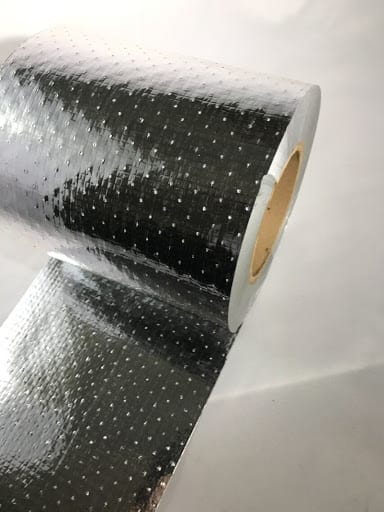CFB Perforated Radiant Shield
For the projects that deserve the very best. This construction grade and industrial grade Radiant Barrier reflective insulation is the thickest and strongest Radiant Barrier product on the market. It can be used in the same applications as our renowned Super R Plus® with the addition of extra strength and rigidity. The increased structural strength of this material makes it the easiest to install. Available in 500 and 1,000 sq. ft. rolls. Perforated or solid depending on the application.
- Thickest and strongest radiant barrier product on the market
- Allows for easier and quicker installation
- Includes all of the same benefits and advantages as the CFB Solid Radiant Shield

One side reflective, one side white film with polyethylene woven reinforcement
32 lbs per 1000 sq ft roll
Length: 21.49 pounds-force
Width: 24.56 pounds-force
ASTM D2261
70°F±5°F & 50±5% Relative Humidity –
No Cracking or Delamination
ASTM C1313-05
180°F±5°F & 50% Relative Humidity –
No Bleeding or Delamination
ASTM C1313-05
Class A/ Class 1
0 Flame Spread, 5 Smoke Development
ASTM Method E84-10
PASS – No Growth
ASTM C1338-08
EMISSIVITY: 0.05
REFLECTIVITY: 95%
ASTM C1371-04a
Has this been tested by an independent laboratory or government agency?
The Florida Solar Energy Center at Cape Canaveral has tested radiant barriers in both small-scale laboratory and full-scale building models. Their results indicate that radiant barriers provide significant resistance to heat transfer. Current tests conducted by the Tennessee Valley Authority and the University of Mississippi support the findings of the Florida Solar Energy Center. Northeastern Illinois University conducted winter tests in residential and commercial structures using infra-red thermograph photography. The photos showed significant resistance to heat transfer over the regular insulation.
Do I need a radiant barrier if my home is well insulated?
A1 SUMMER: “A radiant barrier system can stop 97 percent of the thermal radiation across an attic space. If it is not stopped, that radiant energy would be absorbed by the ceiling insulation and eventually be transferred to the living space below.” The Solar Collector, Quarterly Newsletter of the Florida Solar Energy Center. “The heat storage capacity of reflective insulation is low. As a result, it does not store heat during summer days, only to pass it on down into the rooms of the house from the attic at night when coolness is most apt to be desired from the point of view of sleeping comfort.” Progressive Architecture, Nov. 1949, Page 76. A2 WINTER: “CONCLUSIONS: Reflective foil retrofitted to fiberglass insulated…buildings is demonstrably effective in reducing heat loss… Installation of foil in uninsulated buildings would show even more pronounced reduction in heat loss.” Effects Of Reflective Foil On Heat Loss in Attic Floors and Metal Building Installations, Northeastern Illinois University, Prof. Charles Shabica, May 20, 1986.
What is the "R" value of CFB Radiant Barrier?
The “R” value depends on the number and size of the air spaces surrounding the Radiant Barrier and on the direction of the heat flow. Since Radiant Barrier is usually installed on top of existing mass insulation, its R-value is a moot point. It is Radiant Barrier’s ability to reflect heat that makes it such an energy saver.
Will the aluminum corrode and lose its effectiveness?
A1 “Hundreds of samples of aluminum foil have been stored in the laboratory for various periods of time up to 10 years with no visible signs of deterioration.” American Society of Heating & Air Conditioning Engineers’ Journal Section. A2 “Aluminum is highly resistant to the effect of corrosion… Aluminum is constantly being used where it is exposed to weather, salt spray and other conditions, which would adversely affect most metals.” The United States Rubber Co. Booklet, Serving You Through Science, Page 5.
What about foil-faced fiberglass? Isn't it just as good?
No. The foil on the fiberglass is in direct contact with the attic floor. Aluminum foil becomes more conductive when in contact with a solid surface. The air space facing the reflective surface is of primary importance.
